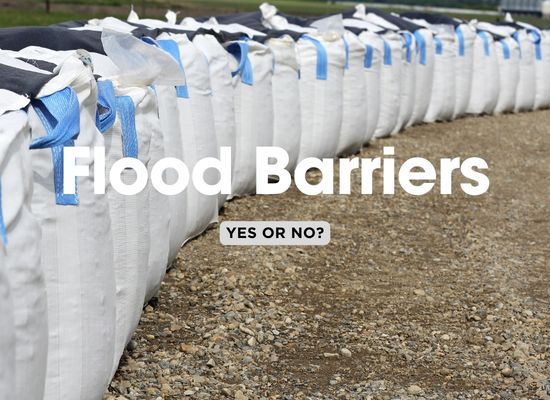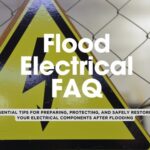Flood barriers are an essential line of defense for protecting homes and businesses in flood-prone areas. From temporary sandbags to permanent flood walls, these barriers come in many forms, each with its own strengths and weaknesses. Understanding the benefits of different types of barriers can help you decide if investing in one is the right choice for your property. Let’s explore the pros of flood barriers in detail.
| FloodMart: Pros of Flood Barriers | ||
|---|---|---|
| Benefit | Description | Examples |
| Protects Property from Water Damage | Flood barriers prevent water from entering your home or business, reducing the risk of structural damage, mold growth, and costly repairs. | Flood gates and inflatable barriers can block water from entering doors and windows during heavy rains or rising floodwaters. |
| Provides Peace of Mind | Having a flood barrier in place offers a sense of security, knowing your property has an extra layer of protection in case of a flood. | Portable flood barriers can be deployed quickly, offering reassurance during unpredictable weather events. |
| Reduces Insurance Costs | Some insurance providers offer discounts for properties with flood barriers, as they reduce the likelihood of flood-related claims. | Installing a permanent flood wall around the property can qualify homeowners for reduced flood insurance premiums. |
| Easy Installation for Many Types | Many flood barriers are designed to be easy to set up, with minimal tools and labor required. | Water-filled barriers and sandbags can be quickly set up with limited preparation, making them ideal for last-minute use. |
| Reusability and Durability | Some flood barriers, such as water-filled and modular barriers, can be reused multiple times, making them cost-effective over the long term. | AquaFence and similar portable barriers are built for repeated use and can withstand multiple flooding events. |
| Versatile Protection | Flood barriers can be customized and placed around doors, windows, driveways, and other vulnerable entry points, adapting to different property layouts. | Flood gates can be installed on doorways and garages, while modular barriers can extend across large open areas. |
Are Flood Barriers Worth the Drawbacks?
While flood barriers offer significant benefits, they also come with certain limitations that are important to consider. Some barriers require extensive installation, regular maintenance, or come with high upfront costs. Knowing the potential downsides can help you make an informed decision on whether a flood barrier is right for your needs. Let’s take a look at the cons in detail.
| FloodMart: Cons of Flood Barriers | ||
|---|---|---|
| Drawback | Description | Examples |
| High Upfront Costs | Some flood barriers, especially permanent structures like flood walls, require a significant initial investment. | Constructing a concrete flood wall around a property can cost thousands of dollars, making it less feasible for some homeowners. |
| Labor-Intensive Installation | Certain barriers require considerable time and effort to set up, especially during emergencies. | Sandbags, for example, need to be filled, stacked, and positioned manually, which can be challenging in a time-sensitive situation. |
| Regular Maintenance Required | Many flood barriers need upkeep to ensure they remain effective, such as checks for leaks or cracks. | Inflatable barriers must be inspected regularly to prevent wear and tear from impacting their functionality. |
| Limited Lifespan for Some Materials | Temporary flood barriers, like sandbags, often deteriorate over time and may need frequent replacement. | Sandbags tend to degrade in wet conditions and typically need to be replaced after each flood season. |
| Not Foolproof | Flood barriers are not always 100% effective, especially against extreme floods or prolonged exposure to high water levels. | During severe storms, even reinforced flood walls can be breached if the water rises beyond their height. |
| Takes Up Space | Some flood barriers, especially modular or permanent ones, require space around the property for installation. | A large flood wall can take up yard space, potentially impacting property aesthetics and access. |
So, Are Flood Barriers Worth It? 🤔
Flood barriers come with a mixed bag of perks and challenges, but for many people, they can be a smart investment. Let’s break it down:
Why Flood Barriers Could Be Worth Every Penny 💸
- Peace of Mind Matters 🧘♂️: Imagine not constantly worrying when heavy rain hits. Flood barriers give you that “extra layer” of calm, knowing you’ve got some added protection when nature doesn’t play nice.
- They’re Not Just for Big Homes 🏡: Think flood barriers are only for waterfront mansions? Nope! Small homes, businesses, and rental properties can all benefit. From simple door covers to more complex flood gates, there are options for nearly every space and budget.
- One-Time Investment, Ongoing Savings 💼: Sure, some barriers cost more upfront. But when you think about the long-term savings on flood damage repairs, plus potential discounts on insurance, that one-time spend starts to make more sense.
- Perfect for Extreme Weather Prep 🌧️: If you live in an area where “storm season” isn’t just an occasional drizzle, flood barriers can be game-changers. They’re designed to hold up against heavy rains, snow melts, and even hurricane surges, giving you time to focus on safety without scrambling last minute.
Why Flood Barriers Might Not Be Right for You 😬
- It’s Not All Foolproof 🚧: Flood barriers are a line of defense, not a magical shield. In rare cases of severe flooding, barriers can be overwhelmed or breached, so it’s always good to have an emergency plan as backup.
- Maintenance – Not the Fun Part 🧹: Flood barriers, especially inflatable or mechanical ones, need some upkeep. If you’re not up for checking on them now and then (to make sure they’re in top shape), they might not give you the protection you’re hoping for.
- They Take Up Space 📏: Whether it’s sandbags or a permanent wall, flood barriers need room. If your property’s tight on space, that’s something to think about before committing.
Bottom Line? Flood barriers make sense for a lot of people, especially if you live in a high-risk area or want extra peace of mind. But they’re an investment – financially and in terms of maintenance – so weigh the pros and cons. They can be a fantastic choice if you’re ready to take on the upfront cost and upkeep for a bit more control over unpredictable weather! 🌦️



